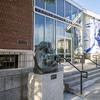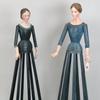The Met Unveils First-Ever Facade Commission With Wangechi Mutu's 'The NewOnes, will free Us'
- NEW YORK, New York
- /
- September 09, 2019
Wangechi Mutu (Kenyan, born 1972) has created four sculptures to inaugurate The Met's new annual commission for the museum's facade—the first-ever display of art in the sculptural niches of the historic Beaux-Arts exterior. Designed by Richard Morris Hunt and completed in 1902, the facade features four niches that were intended originally to house freestanding sculptures but have long remained empty. In filling them now with the extraordinary work of Mutu, The Met brings to fruition a dream 117 years in the making. The Facade Commission: Wangechi Mutu, The NewOnes, will free Us is on view from September 9, 2019, through January 12, 2020.
"The Met's new series of contemporary commissions offers important opportunities for the Museum to engage with artists, and to generate dynamic forms of dialogue between our collection, building, and audiences," said Max Hollein, Director of The Met. "We are honored to inaugurate this historic project on the Museum's facade with the extraordinary work of Wangechi Mutu. The four monumental sculptures she has created transform the facade of The Met with their compelling, powerful, and beautiful presence that commands immediate attention and reflection."
Sheena Wagstaff, Leonard A. Lauder Chairman of Modern and Contemporary Art, added, "Mutu's mythic female figures, draped in figure-hugging coils, are marvelous hybrids of African sculpture and futuristic imagination. Magisterially seated—or with bended knee—these guardian gate-keepers add a new dimension to the experience of arriving at The Met: they will surely cause visitors to stop and think, while also inspiring wonder as they enter this museum filled with thousands of years of world culture."
The Facade Commission is part of a new series of contemporary commissions at The Met in which the Museum invites artists to create new works of art, establishing a dialogue between the artist's practice, The Met collection, the physical museum, and The Met's audiences.
For The Met's facade, Mutu has created four bronze sculptures. They are known individually as The Seated I, II, III, and IV. As a group, they bear the title The NewOnes, will free Us. As with all of her work, Mutu's sculptures engage in a critique of gender and racial politics that is as pointed as it is poetic and fantastic. With The NewOnes, will free Us, the artist has reimagined a motif common to the history of both Western and African art: the caryatid, a sculpted female figure meant to serve as a means of either structural or metaphorical support. Whether carved out of wood for the prestige stool of a West African king or chiseled out of marble for a building on the Athenian Acropolis, the caryatid has always been confined to her role as a load-bearer. For her part, Mutu stages a feminist intervention, liberating the caryatid from her traditional duties and her secondary status. Mutu does so, moreover, in the context of a neo-classical facade whose original architects sought to convey a far more conservative set of values.
Kelly Baum, Cynthia Hazen Polsky and Leon Polsky Curator of Contemporary Art, commented, "The NewOnes, will free Us constitutes one of Mutu's most important and extraordinary bodies of work to date, the culmination of two decades of sustained artistic experimentation and rigorous research into the relationship between power, culture, and representation."
Simultaneously celestial and humanoid, each sculpture is unique, with individualized hands, facial features, ornamentation, and patina. Mutu's embellishments take a great deal of inspiration from customs practiced by specific groups of high-ranking African women. The horizontal and vertical coils that sheathe the figures' bodies, which function as garment and armor all in one, reference beaded bodices and circular necklaces, while the polished discs set into different parts of the sculptures' heads allude to lip plates. Belonging to no one time or place, Mutu's hybrid figures are stately, resilient, and self-possessed. They announce their authority and autonomy. Appearing to have recently arrived on the facade of The Met, they are the "new ones" who bring word of new ideas and new perspectives.
The Facade Commission: Wangechi Mutu, The NewOnes, will free Us was conceived by the artist in consultation with Sheena Wagstaff, Leonard A. Lauder Chairman of Modern and Contemporary Art, and the project curator, Kelly Baum, Cynthia Hazen Polsky and Leon Polsky Curator of Contemporary Art, both of The Met's Department of Modern and Contemporary Art.
Born in Nairobi in 1972 and trained in sculpture at Yale, from which she received her MFA in 2000, Wangechi Mutu is one of the most distinguished artists of her generation. She has achieved critical acclaim for her haunting, otherworldly collage-paintings, art films, live performances, and sculptures. Comprised of either bronze or organic materials, Mutu's three-dimensional work depicts formidable figures referencing modern and classical mythologies that conflate the histories and sculptural traditions of Africa and Europe. Like her collage-paintings, Mutu's sculptures reflect critically on social and ecological injustices and inequalities. Female transformation and empowerment are at the core of all her ideas, as evident in the completed work.
Her work has been the subject of numerous solo shows, including Wangechi Mutu: A Fantastic Journey, which traveled to the Brooklyn Museum, New York; Nasher Museum of Art, Durham, North Carolina; Museum of Contemporary Art North Miami; and Block Museum, Evanston, Illinois. Other solo exhibitions include those at SITE, Santa Fe; Museum of Contemporary Art, Sydney; Musée d'Art Contemporain de Montréal; Deutsche Guggenheim, Berlin; Wiels Center for Contemporary Art, Brussels; Art Gallery of Ontario; Museum of Contemporary Art, San Diego; Kunsthalle Wien; and San Francisco Museum of Modern Art. Mutu is the recipient of Deutsche Bank's Artist of the Year award, the Louis Comfort Tiffany Foundation Grant, the Joan Mitchell Foundation Painters & Sculptors Award, and the American Federation of Arts' Leadership Award. Mutu is featured in the 2019 Whitney Biennial.



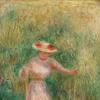
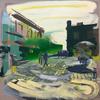
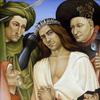

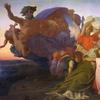


100x100_c.jpg)
